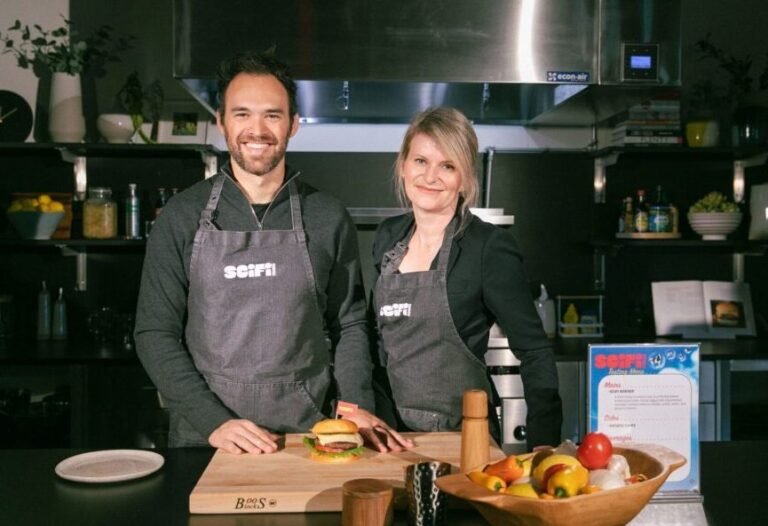Melbourne-based precision fermentation startup Eden Brew—like many players in the emerging animal-free dairy space—has tweaked its strategy to focus on higher-value markets for its initial launch, with tech enabling it to “load” casein micelles with iron, magnesium and zinc.
The firm, which had initially planned to make animal-free milk with dairy co-op Norco featuring its casein proteins, recently pivoted to a b2b strategy focusing on supplements, sports nutrition, and food fortification, reveals CEO Jim Fader.
Speaking to AgFunderNews at the recent Future Food-Tech event in London, Fader noted that when casein molecules are formed in cow’s milk, they fold up into a spherical “micelle” structure in which individual proteins are suspended in a solution along with calcium and other minerals.
“As we scaled to commercial readiness, we discovered that the casein micelle is not just about replicating dairy,” he said. “It’s nature’s slow-release delivery system. When you consume caseins, they form a curd in the stomach that takes 5+ hours to break down, gradually releasing calcium.
“Eden Brew differentiates itself by tapping into this functionality, as we can now deliver iron, magnesium and zinc via this protein-based slow-release system. This paves the way for Eden Brew to develop enriched caseinates for supplements, sports nutrition, and food fortification, in addition to dairy consumer products.
“These micelles are programmable, and the powders can be included in many food categories.”
He added: “The alternative protein sector has struggled to deliver on its potential to consumers and investors, and a strategy to replicate dairy sensory and sell with a sustainability message alone is not going to cut through.
“We have evolved our strategy as we have developed this additional fortification capability, to focus on health outcomes.”
‘A sustainability message alone is not going to cut through’
He added: “We can also drive food fortification and nutrient density, especially for the fast-growing sector of GLP-1 companion foods.”
The firm, which makes Beta, Kappa and Alpha-S1-casein in yeast via precision fermentation, sees “the biggest value in deploying this protein engineering platform as a b2b ingredients supplier, partnering with category leaders in health and supplementation,” said Fader. “These are high-value markets that make sense for us at today’s costs, and as we scale towards cost parity with dairy by 2031, the opportunity only gets bigger.”
‘Nature’s slow-release delivery system’
Asked why loading casein micelles with minerals is better than just adding them to a food or food supplement, Fader said: “The casein micelle is not just a structural protein. It is nature’s slow-release delivery system. That’s a real advantage over many supplements that dose straight into the stomach, which can lead to nausea or upset tummies; iron is a prime example.
“By loading these minerals and other payloads into our micelles, supplement company partners can look to potentially not only improve bioavailability but also reduce side effects.
“Moreover, food companies can look renovate their current formulation to fortify with our protein base to potentially increase nutrient density and functionality. And for those looking to target longevity, or GLP-1 companion foods, our fortified protein base provides a trifecta – for protein content, for nutrient density and a slower delivery – all in a lactose-free and sustainable way.”
‘The ‘animal free’ positioning is confusing for consumers’
As to whether customers care that the dairy proteins are ‘animal-free,’ he said, “I believe the ‘animal free’ positioning is confusing for consumers; since most plant-based products are often animal free, and it doesn’t differentiate. The alt-protein industry needs to focus on making great foods that customers want to eat, with a health positioning, and at no premium to the incumbent leaders in the category.
“Only then does environmental and animal welfare positioning become more meaningful and impactful,” he claimed. “Our strategy is to be a food company first, supplying ingredients and partnering to create products that people actively choose. It’s a customer pull strategy, rather than tech push.
“We have an LOI with a global market leading supplement company who can take our first 18-24 months of production, and potentially much more. We will launch via supplements and sports nutrition and build out our ingredients for functional foods to layer as our next wave of innovation.”
‘Investor interest has shifted with more informed investment thesis in alt protein’
Asked about the manufacturing and scale up plan, he said: “Our plan is to have a few select key manufacturing partners to ensure we have supply chain resilience. We are currently scaling with a world class CMO [contract manufacturing organization] who has significant scale and capacity to meet our volumes.”
Regulatory filings in Australia and the US will be submitted this year, with Singapore to follow, he said. “Our submissions will be for our protein powder to be used as a like-for-like substitute for dairy at the same inclusion levels as exist in foods today. This is for speed to market, and as a second stage, we intend to undertake more complex application pathways for nutritive substances.”
The firm, which raised $15 million in 2023 with support from VC, strategic and government investors in US, Asia, Europe and Australia, is “commencing our next round to fund our go to market next year,” he said.
“Investor interest has shifted with a more informed investment thesis in the alternative protein space. It is no longer enough to sell on sustainability. While capital is harder to raise than in 2020–22, there is strong appetite in health and supplementation.”
Eden Brew’s pivot comes as many players in the precision-fermented dairy space are looking to find ways to tailor their offerings to higher-end health & nutrition markets by switching focus to pricier proteins such as lactoferrin or finding ways to functionalize whey or casein proteins to add more value.
The post The next frontier for animal-free dairy? ‘Slow-release’ mineral delivery, says Eden Brew appeared first on AgFunderNews.





